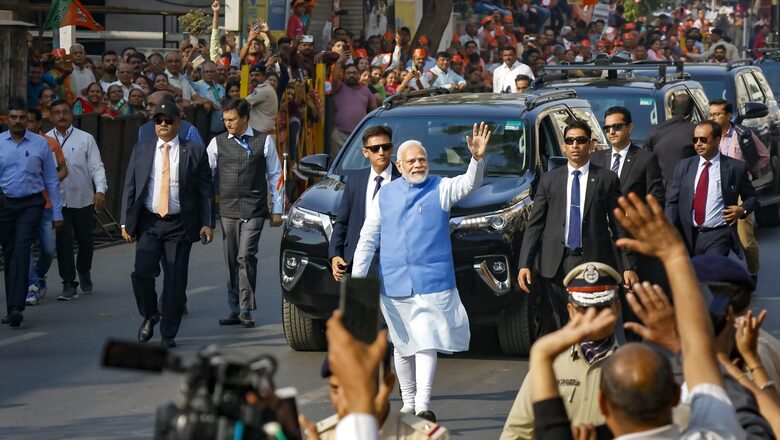
views
It’s no coincidence that India has assumed the presidency of G20 – a grouping of the richest, most industrialised nations – at a time when the world is at a crossroads, unsure of which path to take. The world we inhabit is faced with unprecedented turmoil. The monetary excesses of the developed nations have caused inflation to spike globally. As their central banks now seek to curb inflation by sharply raising interest rates, the Western economies are poised to slip into a recession. The geopolitical tensions, fomented by the Russia-Ukraine war, have only added to global uncertainties, as supply chains are thrown out of gear, exacerbating energy and food crises. The Covid-19 pandemic continues to haunt us, delaying a confident return to normalcy. China’s belligerence and policy of expansionism has hardly helped a world looking for solace.
It is in this bleak backdrop that India’s leadership of G20, which represents roughly 85 percent of the world’s GDP and 67 percent of the global population, becomes manifestly natural. Evidently, India has the intellectual wherewithal and moral authority to provide leadership to a world blighted by disease, war, terrorism, poverty, and climate crisis. This moral authority springs not just from its civilisational reservoir of compassion rooted in the ideal of Vasudhaiva Kutumbakam, but also from its responsible conduct as a powerful member of the international community.
Consider the pandemic, for instance. India shipped precious medical supplies in aid to countries that were battling Covid waves. It sent out millions of Covid vaccine vials, even as it mounted domestically, an inoculation drive, at a scale and speed unprecedented in human history. As a result, India was able to save not only its own citizens, but also held out hope for humanity at large. It’s no surprise, then, that its domestic Covid policy and vaccine diplomacy drew global admiration. India is the ‘pharmacy of the world’, ranking third globally in pharmaceutical production, and exporting medicines to more than 200 countries. India’s positive role during the pandemic has enhanced its reputation as a trustworthy source of medical and food supplies, cementing its global leadership.
At the start of the 18th century, India’s share in the world GDP was nearly 25 percent, a vaunted position of economic leadership that it has not enjoyed since. But India is now working its way to reclaim its lost glory. While most of the developed world is staring at a recession, the country is likely to grow at a healthy rate of 7 percent in 2022-23. Helped by a deep talent pool and enabling policy frameworks, the country is marching on its way to becoming an economic giant. Morgan Stanley, a large US investment bank, estimates that India’s precipitous growth will swell its GDP into the third largest in the world by 2027. In a decade from now, the country’s GDP is likely to vault past $8.5 trillion, more than doubling from $3.4 trillion currently. Some suggest the country’s economy could expand to more than $40 trillion over the next 25 years of Amrit Kaal until 2047, when India would celebrate its independence centenary.
There is a new sense of optimism and confidence, as young Indians, fresh out of college, are no longer queuing up for government jobs. Instead, they are turning into entrepreneurs, creating jobs, and solving real-life problems. It, therefore, comes as no surprise that India is now the third-largest start-up ecosystem in the world, with more than 80,000 new businesses and more than 100 unicorns (whose valuation is at least $1 billion). In 2016, India had only 452 start-ups!
India has built an enviable digital infrastructure, widening financial inclusion and enabling the seamless delivery of services. The roaring success of India’s Unified Payments Interface (UPI), an interbank real-time digital payments system, prompted Google to write to the US Federal Reserve to build a similar platform.
India has never sought to grab any country’s territory. It has provided shelter to the persecuted, often at great costs to itself. It has always advocated peace but has not shied away from fighting a ‘Just War’, as it did in 1971, resulting in the creation of Bangladesh, whose Bengali-speaking people had been oppressed in Pakistan. New Delhi is a credible, responsible atomic power, with an unblemished record on nuclear non-proliferation, one that is acknowledged and respected by global powers. It was the weight of India’s moral authority that prevented the use of nuclear weapons in the ongoing Russia-Ukraine war, a contribution publicly acknowledged by America’s Central Intelligence Agency (CIA).
India’s civilisational instinct is rooted in democracy and consensus-building. We can, therefore, put to good use our long experience in collective decision-making to solve some of the most vexed questions confronting mankind. India’s younger demographic profile gives it a longer growth runway, potentially catapulting it to the top of the global economic heap in the coming decades. The key to lengthening this ‘growth runway’ lies in integrating vocational education with traditional education, buoying employability and revitalising the spirit of entrepreneurship, in consonance with the National Education Policy (NEP) 2020. NEP 2020’s emphasis on vocational education and skill development found a strong resonance in this year’s Union Budget. Finance Minister Nirmala Sitharaman announced setting up 30 Skill India International Centres and a unified Skill India digital platform to facilitate demand-driven formal skilling, while allocating Rs 1.13 trillion, the highest ever, to education. The immense human capital that India can generate through widespread skilling and quality education can aid productivity gains, and also potentially ease labour shortages around the world as several countries confront declining/ageing population.
India offers democracy, demography, and policy certainty to foreign investors looking to diversify their supply chains for resilience in the face of another Covid-like shock. The policy reforms that have been undertaken, and the physical as well as digital infrastructure that has been built, promise to transform India into a military and economic superpower. Power brings with it immense responsibility, and the world is looking at India with great hope and expectations. India’s all-encompassing civilisational vision of Sarve Bhavantu Sukhinah (may everyone be happy and prosperous) should help it lead the world in a manner that brings welfare to the entire mankind.
The author is Joint Director (Media) at NIOS. Views are personal.
Read all the Latest Opinions here




















Comments
0 comment